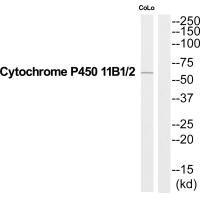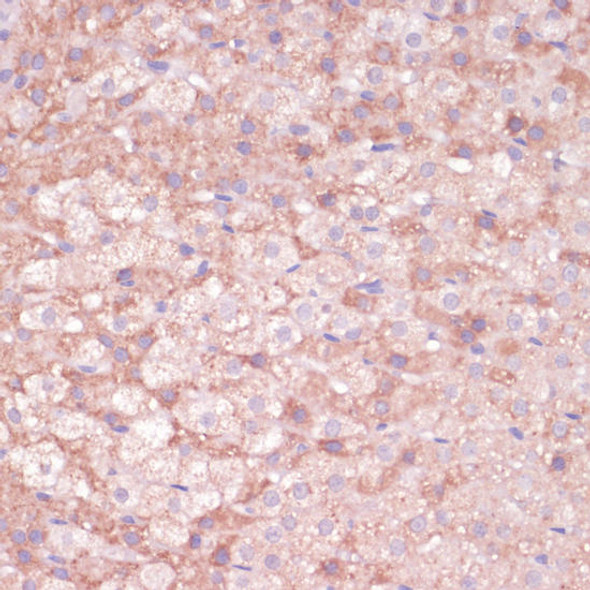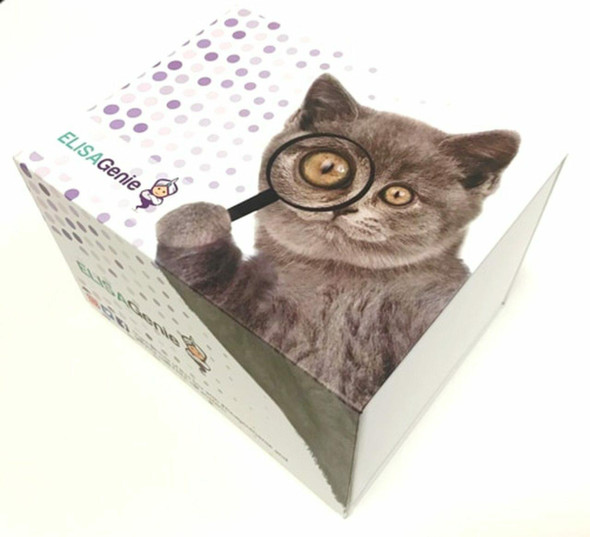Description
| Antibody Name: | CYP11B1/CYP11B2 Antibody (PACO22740) |
| Antibody SKU: | PACO22740 |
| Size: | 100ul |
| Host Species: | Rabbit |
| Tested Applications: | ELISA, WB |
| Recommended Dilutions: | ELISA:1:2000-1:10000, WB:1:500-1:3000 |
| Species Reactivity: | Human |
| Immunogen: | Synthesized peptide derived from C-terminal of human Cytochrome P450 11B1/2. |
| Form: | Liquid |
| Storage Buffer: | Rabbit IgG in phosphate buffered saline (without Mg2+ and Ca2+), pH 7.4, 150mM NaCl, 0.02% sodium azide and 50% glycerol. |
| Purification Method: | The antibody was affinity-purified from rabbit antiserum by affinity-chromatography using epitope-specific immunogen. |
| Clonality: | Polyclonal |
| Isotype: | IgG |
| Conjugate: | Non-conjugated |
 | Western blot analysis of extracts from COLO205 cells, using Cytochrome P450 11B1/2 antibody. |
| Background: | Has steroid 11-beta-hydroxylase activity. In addition to this activity, the 18 or 19-hydroxylation of steroids and the aromatization of androstendione to estrone have also been ascribed to cytochrome P450 XIB. |
| Synonyms: | C11B1; CPN1; CYP11B; CYP11B1; CYPXIB1 |
| UniProt Protein Function: | CYP11B1: Has steroid 11-beta-hydroxylase activity. In addition to this activity, the 18 or 19-hydroxylation of steroids and the aromatization of androstendione to estrone have also been ascribed to cytochrome P450 XIB. Defects in CYP11B1 are the cause of adrenal hyperplasia type 4 (AH4). AH4 is a form of congenital adrenal hyperplasia, a common recessive disease due to defective synthesis of cortisol. Congenital adrenal hyperplasia is characterized by androgen excess leading to ambiguous genitalia in affected females, rapid somatic growth during childhood in both sexes with premature closure of the epiphyses and short adult stature. Four clinical types: salt wasting (SW, the most severe type), simple virilizing (SV, less severely affected patients), with normal aldosterone biosynthesis, non-classic form or late onset (NC or LOAH), and cryptic (asymptomatic). AH4 patients usually have hypertension. Defects in CYP11B1 are a cause of familial hyperaldosteronism type 1 (FH1). It is a disorder characterized by hypertension, variable hyperaldosteronism, and abnormal adrenal steroid production, including 18-oxocortisol and 18-hydroxycortisol. There is significant phenotypic heterogeneity, and some individuals never develop hypertension. The molecular defect causing hyperaldosteronism familial type 1 is an anti-Lepore-type fusion of the CYP11B1 and CYP11B2 genes. The hybrid gene has the promoting part of CYP11B1, ACTH-sensitive, and the coding part of CYP11B2. Belongs to the cytochrome P450 family. 2 isoforms of the human protein are produced by alternative splicing. |
| UniProt Protein Details: | Protein type:Oxidoreductase; EC 1.14.15.4; Lipid Metabolism - C21-steroid hormone; Mitochondrial; Lipid Metabolism - androgen and estrogen Chromosomal Location of Human Ortholog: 8q21 Cellular Component: mitochondrion; mitochondrial inner membrane Molecular Function:steroid 11-beta-monooxygenase activity; iron ion binding; heme binding Biological Process: steroid metabolic process; regulation of blood pressure; xenobiotic metabolic process; C21-steroid hormone biosynthetic process; immune response; glucocorticoid biosynthetic process; glucose homeostasis; sterol metabolic process; aldosterone biosynthetic process; cellular response to hormone stimulus Disease: Glucocorticoid-remediable Aldosteronism; Adrenal Hyperplasia, Congenital, Due To Steroid 11-beta-hydroxylase Deficiency |
| NCBI Summary: | This gene encodes a member of the cytochrome P450 superfamily of enzymes. The cytochrome P450 proteins are monooxygenases which catalyze many reactions involved in drug metabolism and synthesis of cholesterol, steroids and other lipids. This protein localizes to the mitochondrial inner membrane and is involved in the conversion of progesterone to cortisol in the adrenal cortex. Mutations in this gene cause congenital adrenal hyperplasia due to 11-beta-hydroxylase deficiency. Transcript variants encoding different isoforms have been noted for this gene. [provided by RefSeq, Jul 2008] |
| UniProt Code: | P15538 |
| NCBI GenInfo Identifier: | 215274267 |
| NCBI Gene ID: | 1584 |
| NCBI Accession: | P15538.5 |
| UniProt Secondary Accession: | P15538,Q14095, Q4VAQ8, Q4VAQ9, Q9UML2, |
| UniProt Related Accession: | P15538 |
| Molecular Weight: | |
| NCBI Full Name: | Cytochrome P450 11B1, mitochondrial |
| NCBI Synonym Full Names: | cytochrome P450, family 11, subfamily B, polypeptide 1 |
| NCBI Official Symbol: | CYP11B1 |
| NCBI Official Synonym Symbols: | FHI; CPN1; CYP11B; P450C11 |
| NCBI Protein Information: | cytochrome P450 11B1, mitochondrial; CYPXIB1; cytochrome P450C11; cytochrome P-450c11; cytochrome p450 XIB1; steroid 11-beta-hydroxylase; steroid 11-beta-monooxygenase; cytochrome P450, subfamily XIB (steroid 11-beta-hydroxylase), polypeptide 1 |
| UniProt Protein Name: | Cytochrome P450 11B1, mitochondrial |
| UniProt Synonym Protein Names: | CYPXIB1; Cytochrome P-450c11; Cytochrome P450C11; Steroid 11-beta-hydroxylase (EC:1.14.15.4) |
| Protein Family: | Cytochrome |
| UniProt Gene Name: | CYP11B1 |
| UniProt Entry Name: | C11B1_HUMAN |






